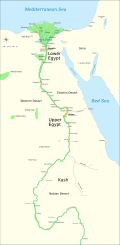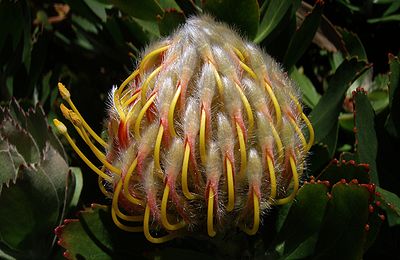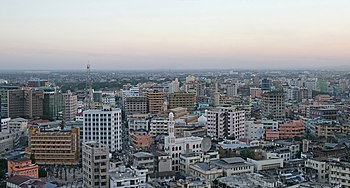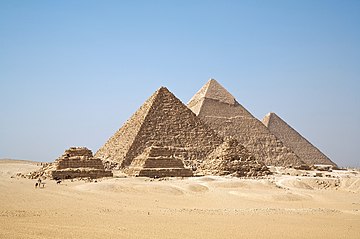Portal:Africa



Africa is the world's second-largest and second-most populous continent after Asia. At about 30.3 million km2 (11.7 million square miles) including adjacent islands, it covers 20% of Earth's land area and 6% of its total surface area. With nearly 1.4 billion people as of 2021, it accounts for about 18% of the world's human population. Africa's population is the youngest among all the continents; the median age in 2012 was 19.7, when the worldwide median age was 30.4. Based on 2024 projections, Africa's population will reach 3.8 billion people by 2099. Despite a wide range of natural resources, Africa is the least wealthy continent per capita and second-least wealthy by total wealth, ahead of Oceania. Scholars have attributed this to different factors including geography, climate, corruption, colonialism, the Cold War, and neocolonialism. Despite this low concentration of wealth, recent economic expansion and a large and young population make Africa an important economic market in the broader global context. Africa has a large quantity of natural resources and food resources, including diamonds, sugar, salt, gold, iron, cobalt, uranium, copper, bauxite, silver, petroleum, natural gas, cocoa beans, and.
Africa straddles the equator and the prime meridian. It is the only continent to stretch from the northern temperate to the southern temperate zones. The majority of the continent and its countries are in the Northern Hemisphere, with a substantial portion and a number of countries in the Southern Hemisphere. Most of the continent lies in the tropics, except for a large part of Western Sahara, Algeria, Libya and Egypt, the northern tip of Mauritania, and the entire territories of Morocco, Ceuta, Melilla, and Tunisia, which in turn are located above the tropic of Cancer, in the northern temperate zone. In the other extreme of the continent, southern Namibia, southern Botswana, great parts of South Africa, the entire territories of Lesotho and Eswatini and the southern tips of Mozambique and Madagascar are located below the tropic of Capricorn, in the southern temperate zone.
Africa is highly biodiverse; it is the continent with the largest number of megafauna species, as it was least affected by the extinction of the Pleistocene megafauna. However, Africa also is heavily affected by a wide range of environmental issues, including desertification, deforestation, water scarcity, and pollution. These entrenched environmental concerns are expected to worsen as climate change impacts Africa. The UN Intergovernmental Panel on Climate Change has identified Africa as the continent most vulnerable to climate change.
The history of Africa is long, complex, and varied, and has often been under-appreciated by the global historical community. In African societies, the historical process is largely a communal one, with eyewitness accounts, hearsay, reminiscences, and occasionally visions, dreams, and hallucinations, crafted into oral traditions, leading some to term them oral civilisations. Time is sometimes mythical and social, and truth generally viewed as relativist. The lack of comprehensive written records has meant that African history used to largely be written by outsiders, Europeans and Arabs, with contemporary historians tasked with decolonising African historiography. (Full article...)
Selected article –
Dougga or Thugga or TBGG was a Berber, Punic and Roman settlement near present-day Téboursouk in northern Tunisia. The current archaeological site covers 65 hectares (160 acres). UNESCO qualified Dougga as a World Heritage Site in 1997, believing that it represents "the best-preserved Roman small town in North Africa". The site, which lies in the middle of the countryside, has been protected from the encroachment of modern urbanization, in contrast, for example, to Carthage, which has been pillaged and rebuilt on numerous occasions. Dougga's size, its well-preserved monuments and its rich Numidian-Berber, Punic, ancient Roman, and Byzantine history make it exceptional. Amongst the most famous monuments at the site are a Libyco-Punic Mausoleum, the Capitol, the Roman theatre, and the temples of Saturn and of Juno Caelestis. (Full article...)
Featured pictures –
Did you know (auto-generated) -

- ... that African-American journalist Erna P. Harris was called a "fearless critic" of the internment of Japanese Americans by the US government during World War II?
- ... that Jane C. Beck traveled to Virginia, West Africa, and England to research the family history of Daisy Turner for her 2015 book Daisy Turner's Kin: An African American Family Saga?
- ... that after first alerting authorities to the Omicron variant in South Africa, bioinformatician Tulio de Oliveira insisted that its origin is unknown?
- ... that Muhsin Hendricks of South Africa has been described as "the world's first openly gay imam"?
- ... that American doctor Cory Synhorst SerVaas believed that high-lysine corn could help end hunger in Africa, end famine, and stop protein deficiency despite only being fed to livestock and poultry?
- ... that South African anti-apartheid activist Ebrahim Ismail Ebrahim confused warders at the Robben Island maximum security prison by playing Bollywood music?
Categories
Selected biography –

Ranavalona III (Malagasy pronunciation: [ranaˈvalːə̥]; 22 November 1861 – 23 May 1917) was the last sovereign of the Kingdom of Madagascar. She ruled from 30 July 1883 to 28 February 1897 in a reign marked by ultimately futile efforts to resist the colonial designs of the government of France. As a young woman, she was selected from among several Andriana qualified to succeed Queen Ranavalona II upon her death. Like both preceding queens, Ranavalona entered a political marriage with a member of the Hova elite named Rainilaiarivony, who largely oversaw the day-to-day governance of the kingdom and managed its foreign affairs in his role as prime minister. Ranavalona tried to stave off colonization by strengthening trade and diplomatic relations with foreign powers throughout her reign, but French attacks on coastal port towns and an assault on the capital city of Antananarivo led to the capture of the royal palace in 1895, ending the sovereignty and political autonomy of the centuries-old kingdom.
Ranavalona and her court were initially permitted to remain as symbolic figureheads, but the outbreak of a popular resistance movement called the menalamba rebellion, and the discovery of anti-French political intrigues at court led the French to exile her to the island of Réunion in 1897. Rainilaiarivony died that same year, and Ranavalona was relocated to a villa in Algiers, along with several members of her family. The queen, her family, and the servants accompanying her were provided an allowance and enjoyed a comfortable standard of living, including occasional trips to Paris for shopping and sightseeing. Ranavalona was never permitted to return home to Madagascar, however, despite her repeated requests. She died of an embolism at her villa in Algiers in 1917 at age 55. Her remains were buried in Algiers but were disinterred 21 years later and shipped to Madagascar, where they were placed within the tomb of Queen Rasoherina on the grounds of the Rova of Antananarivo. (Full article...)
Selected country –
 |
 |
|

| ||
Madagascar, officially the Republic of Madagascar (older name Malagasy Republic), is an island nation in the Indian Ocean, off the southeastern coast of Africa. The main island, also called Madagascar, is the fourth largest island in the world, and is home to five percent of the world's plant and animal species, more than 80 percent of which are endemic to Madagascar. Agriculture, including fishing and forestry, is a mainstay of the economy. Major exports are coffee, vanilla, sugarcane, cloves, cocoa, rice, cassava (tapioca), beans, bananas, peanuts and livestock products.
The principal institutions of the Republic of Madagascar are a presidency, a parliament (National Assembly and Senate), a prime ministry and cabinet, and an independent judiciary. The president is elected by direct universal suffrage for a 5-year term, renewable twice. The National Assembly consists of 160 representatives elected by direct vote every 5 years. The Senate consists of 90 senators, two-thirds elected by local legislators and other Grand Electors and one-third appointed by the president, all for 6-year terms. (Read more...)
Selected city –

Rabat (/rəˈbɑːt/, also UK: /rəˈbæt/, US: /rɑːˈbɑːt/; Arabic: الرباط, romanized: ar-Ribāṭ) is the capital city of Morocco and the country's seventh-largest city with an urban population of approximately 580,000 (2014) and a metropolitan population of over 1.2 million. It is also the capital city of the Rabat-Salé-Kénitra administrative region. Rabat is located on the Atlantic Ocean at the mouth of the river Bou Regreg, opposite Salé, the city's main commuter town.
Rabat was founded in the 12th century by the Almohads. After a period of growth, the city fell into a long period of decline. In the 17th century, Rabat became a haven for Barbary pirates. When the French established a protectorate over Morocco in 1912, Rabat became its administrative center. When Morocco achieved independence in 1955 Rabat became its capital. (Full article...)
In the news
- 12 February 2024 –
- Two boats collide on the Congo River near Kinshasa, Democratic Republic of the Congo; with the death toll remains unclear. (AP)
- 11 February 2024 – 2023 Africa Cup of Nations
- In association football, hosts Ivory Coast win their third Africa Cup of Nations by defeating Nigeria 2–1 in the final. Sébastien Haller scores the winning goal in the 81st minute. (The Guardian)
- 10 February 2024 – Somali civil war
- Four Emirati soldiers and a Bahraini military officer are killed, while ten other people are injured, when a soldier opens fire at a military base in Mogadishu, Somalia, before being killed in the ensuing shootout. Al-Shabaab claims responsibility. (AP)
- 10 February 2024 –
- A Eurocopter EC130 helicopter crashes near Nipton, California, United States, killing all the six people on board, including Nigerian banker Herbert Wigwe. (CBS News)
- 10 February 2024 – 2023–2024 Senegalese protests
- Violent protests occur in Senegal following an announcement by President Macky Sall that presidential elections have been delayed from February 25 to December 15. (Sky News)
- 9 February 2024 –
- At least 18 people are killed during a collision between a bus and a truck on a road in Kinshasa, Democratic Republic of the Congo. (AP)
Updated: 16:33, 14 February 2024
General images -
Africa topics
More did you know –

- ... that the British Museum's oldest African-American object is the Akan Drum (pictured) that was used to "dance the slaves"?
- ... that L.C. Lecesne rose to prominence as an activist against slavery after the British Government compensated him for his illegal exile from Jamaica?
- ... that despite receiving a budget allocation in 2003, the public sports stadium in Gibeon, Namibia, hadn't been repaired as of December 2007?
- ... that Thomas Edward Wilkinson was made Bishop of Zululand after his predecessor in South Africa, John Colenso, was excommunicated?
Related portals
Major Religions in Africa
North Africa
West Africa
Central Africa
East Africa
Southern Africa
Associated Wikimedia
The following Wikimedia Foundation sister projects provide more on this subject:
-
Commons
Free media repository -
Wikibooks
Free textbooks and manuals -
Wikidata
Free knowledge base -
Wikinews
Free-content news -
Wikiquote
Collection of quotations -
Wikisource
Free-content library -
Wikispecies
Directory of species -
Wikiversity
Free learning tools -
Wikivoyage
Free travel guide -
Wiktionary
Dictionary and thesaurus
























































































